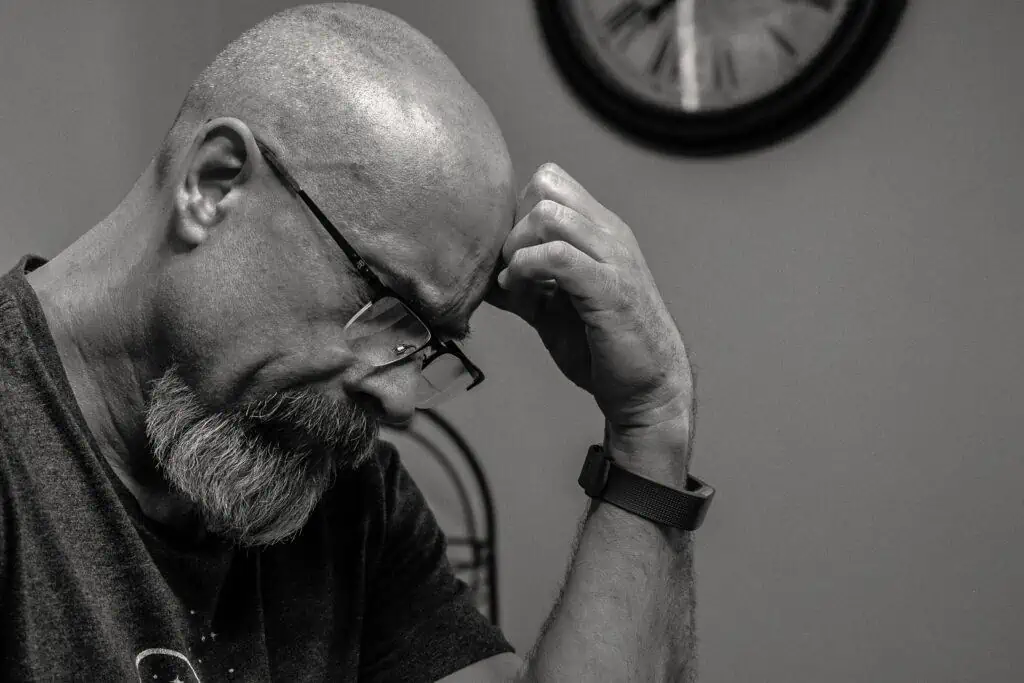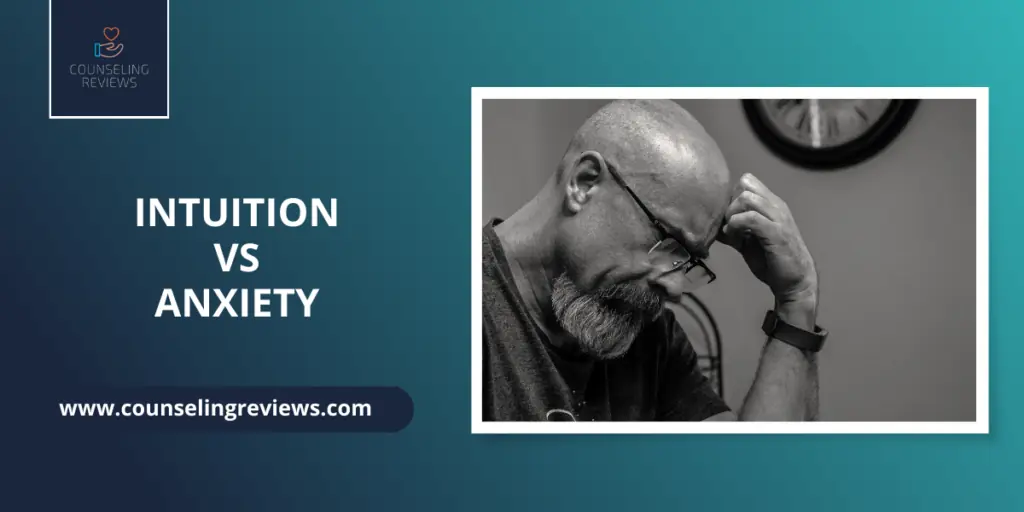People often talk about intuitions when they feel perceptive or have a gut feeling. The APA Dictionary of Psychology defines intuition as an immediate insight or perception in contrast with awareness of something that results from reflection or conscious reasoning. In other words, when you experience intuition, something strikes your mind out of nowhere and brings certain awareness to the surface.
Anxiety, on the other hand, makes us imagine catastrophic events or anticipate impending danger. Anxiety is perceived as an unpleasant emotion resembling physical tension, psychological dread, and apprehension. Anxiety can be further differentiated from fear, a present-oriented and appropriate response to an identifiable threat.
Intuition may or may not be emotion-laden, but anxiety is an unpleasant emotion. In this article, we look at how these two states of mind differ and how you can approach the two more efficiently.
Why is it Important to Understand the Relationship Between Intuition and Anxiety?
People in therapy for anxiety often think about the future and ruminate about the present. As a result, they expend a lot of cognitive resources by worrying and thinking about the future. Insights derived from these worries may or may not be accurate and tend to be spurred by automatic negative thoughts and negative core beliefs. In therapy sessions, clients may discuss both anxiety and intuition to learn to make better decisions.
Anxiety-prone clients insist they are convinced things will unfold exactly like their intuition. Most of the time, these beliefs about future events may not be intuition but rather anxiety-laden cognitions that feel real. Hence, understanding the relationship between intuitions and anxiety helps reduce stress and encourages self awareness.
Intuition
Intuition feels like what people often describe as a gut feeling. However, at the time of the intuition perception, you usually wouldn’t feel strong emotions. It feels like a rational and objective awareness of something that might happen in the present or the future.

How Intuition Works
Inclusion can be described as your natural ability to know or understand what might happen in the future without any conscious effort. Scientists believe that you experience an intuition when your creativity, pattern recognition skills and memory work together to make sense of your situation.
At the time of intuition, your mind works to make sense of the future and guide you through obstacles. However, this does not mean intuitions will always come true. It just feels like they will.
Characteristics of Intuition
Intuitions are characterized by a sense of calmness and composure. Strong emotions do not accompany them. Instead, it feels like a natural awareness of something objective, rational, and accurate, but in the future.
Positive Aspects of Intuition
If you think you are being intuitive about something, it may be your mind’s way to make sense of the future. Hence, intuition can lead to transparent decision-making, gaining insight into your internal world, and improved therapeutic outcomes.
Negative Impacts of Intuition
Although intuition feels logical and rational, there is no way to know that what feels like a gut feeling will eventually come true. It could even be anxiety masked as intuition. Many chronically anxiety-prone people may convince themselves that cognitive distortions such as catastrophization, magnification, etc., are intuition.
Anxiety
Anxiety is an unpleasant emotion that can help deal with threats in the future. However, it often becomes problematic as many people experience anxiety even when there are no apparent signs of danger or threat. It is often described as a combination of physical sensations, automatic negative thoughts, and unpleasant emotions such as dread, an impending sense of doom, and fear.

How Anxiety Works
Anxiety is your natural response to a perceived threat in the future. As a result of anxiety, your mind tells you to fight or escape the situation. When there is no real threatening situation to escape, anxiety can cause you to overthink and experience a strong sense of dread and fear.
Common Triggers and Symptoms of Anxiety
There are a number of triggers that can lead to worsening symptoms of anxiety. These include being physically tired, being exposed to stressful situations, not having social support, and maladaptive coping mechanisms such as substance use. Many people may experience generalized anxiety during various times of the day without any triggers. Some of the common symptoms of anxiety include:
- A sense of impending doom and fear
- Feeling agitated
- Inability to sleep, relax, or unwind
- Digestive issues, physical pain, headaches, etc.
- Trembling knees, tremors, and shivering
- Feeling overwhelmed by situations
- Failure to manage automatic negative thoughts
Characteristics of Anxiety
Anxiety is an unpleasant emotion that is characterized by both physical and psychological symptoms. Physically, a person may experience trembling, inability to sleep or relax, having to go to the bathroom several times, etc. Psychologically, a person may experience various unpleasant emotions such as fear, dread, nervousness, etc. An anxious person also experiences a greater volume of automatic negative thoughts, which leads to the vicious cycle of feeling more anxious.
Negative Impacts of Anxiety
Anxiety is a crippling condition that can interfere with your interpersonal relationships, occupational functioning, and your sense of well-being. Unless you address it with therapy and medicines, it has a wide-ranging effect on your life.
The Relationship Between Intuition and Anxiety
Intuition is a cognitive function involving memory, creative thinking, and pattern recognition skills working together to present an effortless insight. When you experience intuition, you do not consciously conjure it. It just happens on its own. Anxiety, on the other hand, can be both voluntary and involuntary. Anxiety encourages many automatic negative thoughts to surface, making you fearful and anxious.
How Anxiety Can Interfere with Intuition
People with anxiety experience automatic negative thoughts and look at the world from an anxiety-colored perspective. This often leads them to visualize the future negatively. They may mistake these anxiety-generated thoughts and feelings as “intuition” and get more anxious than they were initially.
How Intuition Can Alleviate Anxiety
When true intuition surfaces, that is, when it is not forced or kindled by anxiety, it can provide clarity. As intuition provides useful insight at times, a person with anxiety can use it as a guiding force to deal with situations in the future. This sense of control and self-confidence may help reduce levels of anxiety. However, knowing there is no way to tell if intuitions will come true is essential.
Balancing Intuition and Anxiety
People with anxiety often get confused with perceptive thinking and may infer that their anxiety-laden perceptions are, in fact, intuitions. It is essential to work with your therapist and share your intuitions and anxiety-laden thoughts and beliefs so that they can help you balance the two. Journaling your intuitions is an excellent way to balance your anxiety as well.
Practical Examples – Real-Life Scenarios
Here are two real-life scenarios that depict the act of balancing intuition and anxiety.
Scenario 1: While brewing your morning coffee, you may feel that something’s not right with your body. You may wonder if this is intuition or health anxiety. As health is important and perceiving that something’s not right should warrant an investigation, you may fix an appointment with your doctor. He may run some blood tests to determine if you have elevated sugar levels. The tests may further reveal elevated sugar levels for which you must seek treatment.
Scenario 2: While walking, you may suddenly feel your friend could be unwell. This may make you worried, leading you to call up your friend during his business hours. You might want to reassess your initial worry and tell yourself that this couldn’t be intuition as you feel an emotion alongside (feeling worried). Hence, you could tell yourself you are anxious and not experiencing intuition. Instead of calling the friend immediately, you may postpone it until evening.
Strategies for Harnessing Intuition and Managing Anxiety
Please note that intuition cannot be generated or harnessed. It often surfaces in your mind on its own and lacks accompanying emotions.
Anxiety can be voluntarily induced by thinking anxiety-provoking thoughts, or it may appear involuntarily on its own. To manage anxiety, you can do the following:
- Seek therapy, preferably cognitive behavior therapy
- Implement sleep hygiene
- Exercise for 30 minutes at least five times a week
- Drink enough water and get ample rest
Appraise your situation logically.
As you can see, emotions do not accompany intuition, but anxiety is usually emotion-laden. Both tell you what the future holds for you, and both may misguide you as well.
For example, anxiety relies heavily on automatic negative thoughts and negative core beliefs to form scenarios in the future. However, these scenarios which get played in your mind are usually exaggerated and may not come true. Similarly, intuition may feel logical and insightful, but there is no way to confirm if the intuition will come true.
It is essential to appraise your situation logically and ensure you do not rely heavily on intuition or become convinced that your anxiety-induced predictions will come true. Therapeutic insight can help you differentiate between the two and use logic to decide based on evidence and fact.





